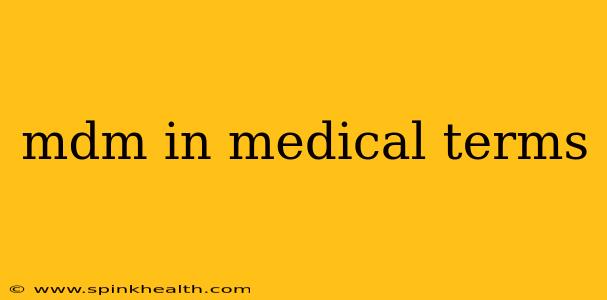Have you ever seen "MDM" in a medical chart or heard a doctor mention it? It might sound like a secret code, but it's actually a crucial part of healthcare: Medical Decision Making (MDM). This isn't just about diagnosing a cold; it encompasses the complex process of evaluating a patient's condition, considering various treatment options, and ultimately choosing the best course of action. Let's delve into the world of MDM and answer some common questions.
What Does MDM Mean in Medical Billing?
In medical billing, MDM is a key factor determining the level of reimbursement a doctor receives. The complexity of the decision-making process directly impacts the level assigned—from a simple evaluation to a highly complex one. Think of it like this: diagnosing a common cold involves a straightforward MDM, while managing a patient with multiple chronic conditions requiring complex interactions with specialists involves a high-level MDM. Insurance companies use this system to ensure doctors are fairly compensated for the time and expertise involved in caring for patients with varying levels of complexity. This often involves a detailed documentation process to demonstrate the justification for the level of MDM claimed.
What are the Different Levels of MDM?
The levels of MDM are typically categorized into low, moderate, and high complexity. These levels aren't simply arbitrary; they reflect the depth and breadth of the medical decision-making process:
-
Low Complexity: This often involves a routine follow-up visit for a stable condition, requiring minimal data review and a straightforward treatment plan. Think of a check-up for a patient with well-controlled hypertension.
-
Moderate Complexity: This involves a more detailed assessment, perhaps involving multiple diagnoses or a need to consider different treatment options. For example, a patient presenting with new symptoms requiring a thorough history, examination, and diagnostic testing might fall into this category.
-
High Complexity: This is the most complex category, involving substantial data review, multiple diagnoses, significant risk factors, and a complex treatment plan requiring coordination with other specialists. Managing a patient with several chronic illnesses or a serious acute condition requiring a multidisciplinary approach falls into this category.
How is MDM Determined?
Determining the level of MDM isn't a simple formula. It's a judgment call based on several factors:
-
Number of Diagnoses: The more diagnoses a patient has, the more complex the MDM.
-
Risk of Mortality or Morbidity: Patients with higher risks of serious complications require more extensive MDM.
-
Amount and Complexity of Data: The more data that needs to be reviewed (lab results, imaging studies, consultations), the higher the MDM level.
-
Treatment Planning: A simple treatment plan warrants a lower MDM level compared to a complex one requiring close monitoring, adjustments, or coordination with specialists.
-
Risk Adjustment: This accounts for the patient's overall health status and the potential complications that might arise.
What are the Components of MDM?
MDM is a multi-faceted process that encompasses several key components:
-
History of Present Illness: A detailed account of the patient's symptoms, their onset, and progression.
-
Review of Systems: A systematic evaluation of all body systems to identify any potential issues.
-
Physical Examination: A thorough hands-on assessment of the patient's physical condition.
-
Diagnostic Testing: Review of all relevant diagnostic tests such as blood work, imaging, etc.
-
Risk Assessment: Evaluating the potential risks associated with the patient's condition and any proposed treatments.
-
Treatment Planning: Developing a comprehensive and tailored treatment plan addressing the patient's specific needs.
Why is Accurate MDM Coding Important?
Accurate MDM coding is crucial for several reasons:
-
Fair Reimbursement: Ensures physicians are compensated fairly for their time and expertise.
-
Compliance with Regulations: Adherence to coding guidelines avoids potential penalties from insurance companies or government agencies.
-
Data Accuracy: Accurate MDM coding contributes to the overall accuracy of healthcare data, which is essential for research and planning.
The world of MDM might seem intricate, but understanding its basic principles is essential for patients and healthcare professionals alike. It's not just about billing; it represents the heart of thoughtful, patient-centered care. It’s the careful consideration and skilled decision-making process that ensures patients receive the right treatment at the right time.

